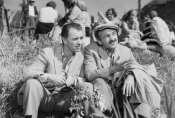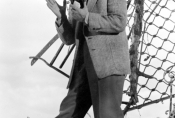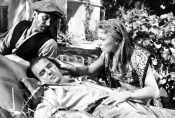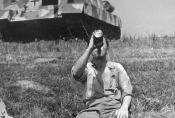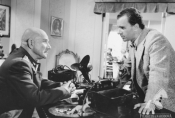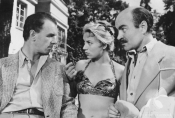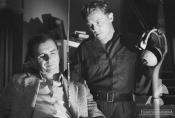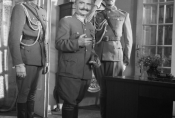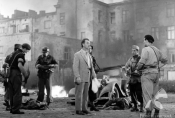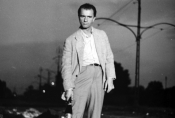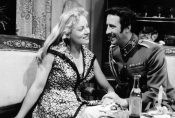HEROISM (EROICA) [1957]
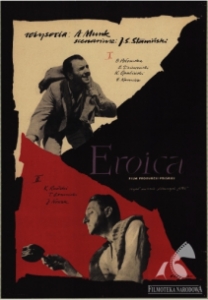
year:
- 1957
release date:
- 4 I 1958
runtime:
- 78 min
directed by:
- Andrzej Munk
written by:
- Jerzy Stefan Stawiński based on his own short stories
director of photography:
- Jerzy Wójcik
cast:
- Edward Dziewoński [Dzidziuś Górkiewicz], Barbara Połomska [Zosia, wife of Dzidziuś], Ignacy Machowski [major Grzmot], Leon Niemczyk [Istvan Kolya, a Hungarian officer], Kazimierz Rudzki [Lieutnant Turek], Henryk Bąk [Lieutnant Krygier], Mariusz Dmochowski [Lieutnant Korwin-Makowski], Roman Kłosowski [Lieutnant Szpakowski], Bogumił Kobiela [Lieutnant Dąbecki], Tadeusz Łomnicki [Lieutnant Zawistowski], Wojciech Siemion [Lieutnant Marianek], Tadeusz Janczar [Andrzej, a Tatra courier], Teresa Szmigielówna [Katarzyna, a nun], Witold Pyrkosz [Kardas, a musician], Roman Polański [angel caroller]
edited by:
- Jadwiga Zajiček
music by:
- Jan Krenz
production design:
- Jan Grandys
produced by:
- Studio Filmowe „Kadr
executive producer:
- Stanisław Adler
awards:
-
- IFF Mar del Plata (Argentina) 1959: award for the best set of films, awards for the best screenplay, FIPRESCI Award
- The Warsaw Mermaid 1959
About the film
The film is a remarkable achievement of the Polish Film School. It is an ironic resolution to the myth of heroism that has been manifest in our culture for generations. It inspired a public debate about the national character of Poles.
Segment I. Scherzo alla Polacca
Segment II. Ostinato lugubre
Segment III. Con bravura
Munk decided that Segment III was not good enough and cut it from the final version of the film.
(I) The Warsaw Uprising starts in 1944. Dzidziuś Górkiewicz leaves the capital in panic. He makes a lot of money on trade and does not want to die. He meets his wife in Zalesie. There, he finds a Hungarian officer, Istvan. The officer tells him that the Hungarians in the detachment stationed in the town want to help the fighting insurgents. Dzidziuś goes back to Warsaw to pass this information to the Mokotów commander. The Uprising command delegate a Major to carry out negotiations with the Hungarians. Risking his life, Dzidziuś leads him to Istvan. The next day the Major announces to Górkiewicz that the Hungarians have set some conditions. They want the Russians, stationed on the other side of the Vistula, to recognise them as insurgents. The Major is exhausted from his journey and cannot walk. Górkiewicz goes back to Warsaw. In the capital, he is captured by the insurgent police and arrested as a spy. Only after many hours does Dzidziuś manage to get to the commander, who entrusts him with an encrypted report.
At night Górkiewicz visits a friend of his, a girl, who is a liaison, and gets drunk. Still intoxicated, he leaves Warsaw under German fire. He delivers a report which states that the Poles have refused the Hungarian offer. The Hungarian detachment leaves Zalesie. Dzidziuś’s wife speaks of a peaceful life with him. Meanwhile, Górkiewicz decides to return to fight in Warsaw at the last minute.
(II) Polish officers are interned in a POW camp. They talk about Lieutenant Zawistowski who escaped from the camp and was never captured by the Germans. It is only this legend that consolidates the conflicted men, mentally disturbed by their long captivity. Lieutenant Kurzawa is placed in the camp after the Warsaw Uprising. After a while he learns from officer Turek that Zawistowski did not escape. He has been hiding in the camp for years, not wanting to destroy the myth of his own legend. Having learned this secret, Kurzawa helps Zawistowski survive. He brings him food and cigarettes. Inspired by Zawistowski, Lieutenant Żak tries to escape and is caught behind the barbed wire. He tries to escape again and is killed by a guard. His death shakes the POW camp. Meanwhile, exhausted, Zawistowski dies. The problem arises – how to dispose of the body? Turek wants to maintain the legend of the heroic lieutenant. He pleads with the camp commandant. As a result of their conversation, Zawistowski’s body is clandestinely carried out by an SS unit in a large boiler.
Joanna Piątek, Leksykon polskich filmów fabularnych, Warszawa 1996
Articles
-
Bodiless Enemy
Rafał Marszałek
„Kwartalnik Filmowy” – Special Issue 2013: “Polish Film Scholars on Polish Cinema”
